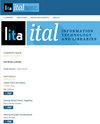Do Space的虚拟面试实验室
IF 1.5
4区 管理学
Q3 COMPUTER SCIENCE, INFORMATION SYSTEMS
引用次数: 0
摘要
当我们开始摆脱新冠肺炎大流行时,是时候开始思考我们在图书馆做出了哪些改变来应对,并决定哪些图书馆应该保留,哪些图书馆需要与大流行一起结束。在这篇社论中,NE奥马哈Do Space的技术经理Michael P.Sauers将他们的虚拟面试实验室作为流行病灵活性以及简单解决方案如何带来巨大好处的案例研究。本文章由计算机程序翻译,如有差异,请以英文原文为准。
Do Space’s Virtual Interview Lab
As we start to pull ourselves out of the COVID-19 pandemic it’s time to start thinking about what changes we made at our libraries in response and decide which ones we should keep and which ones need to end along with the pandemic itself. In this editorial Michael P. Sauers, Technology Manager for Do Space in Omaha, NE uses their Virtual Interview Lab as a case study in pandemic flexibility and how simple solutions can have great benefits.
求助全文
通过发布文献求助,成功后即可免费获取论文全文。
去求助
来源期刊

Information Technology and Libraries
管理科学-计算机:信息系统
CiteScore
2.90
自引率
5.60%
发文量
25
审稿时长
1 months
期刊介绍:
Information Technology and Libraries publishes original material related to all aspects of information technology in all types of libraries. Topic areas include, but are not limited to, library automation, digital libraries, metadata, identity management, distributed systems and networks, computer security, intellectual property rights, technical standards, geographic information systems, desktop applications, information discovery tools, web-scale library services, cloud computing, digital preservation, data curation, virtualization, search-engine optimization, emerging technologies, social networking, open data, the semantic web, mobile services and applications, usability, universal access to technology, library consortia, vendor relations, and digital humanities.
 求助内容:
求助内容: 应助结果提醒方式:
应助结果提醒方式:


